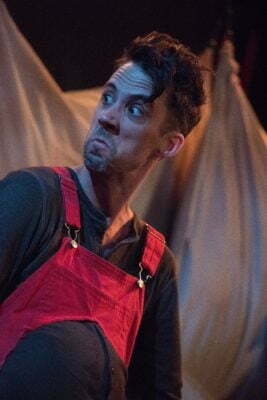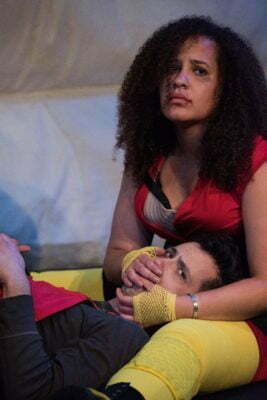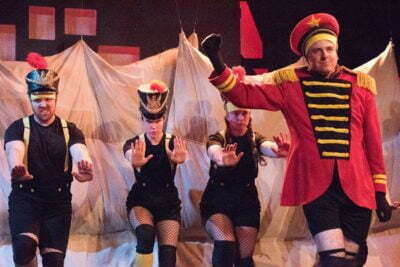King Ubu
Written by Alfred Jarry.
Freely Adapted by Alexander Gelman.
Directed by Alexander Gelman.
Produced by Organic Theater Company.
Playing at The Greenhouse Theater Center, Chicago.
An Absurdly Funny and Imaginative Theater Experience.

For Organic Theater Company’s current production of King Ubu (running in repertory with Emilie), Director Gelman tickles our funny bones—but not before tickling our minds with his director’s notes. 19th century French symbolist writer Alfred Jarry wrote King Ubu as “a response to tyranny,” Gelman writes, “[b]ut rather than railing against despotism’s obvious sins, he chose to treat its inherent pettiness, narrow-mindedness, and inanity with the ridicule they deserve.” “In Ubu’s cosmos,” he goes on, “history, tragedy, and farce are no longer antithetical. In fact, they seem to be interchangeable.” Today, in our world—a world that may bear a passing resemblance to Ubu’s— Gelman concludes that “[a]bsurdism is the clearest way to view reality.” While these claims are arguable, reflection on these points I think is fruitful—and may make for lively discussion after the entertaining, nutty escapade that is King Ubu.
King Ubu is an absurd farce whose non sequiturs and dream-logic progression do all but willfully defy synopsis. It’s simply fun and silly—but not the kind of silly that stupefies and alienates its adult audience (there was a wide demographic present the day I attended, and everyone was laughing). Rather, its fun and silliness stretch from wing to wing, start to finish, in a cohesive whole; a kind of upside-down, obverse image of a world whose illogical movements follow their own logic—and take you for a ride.
The play begins with Pa Ubu (Joel Moses)—an impulsive and petulant nincompoop with a potbelly—and Ma Ubu (Alys Dickerson)—a wily lady who definitely wears the pants—discussing claiming power in their land of Foland (sic). The spine of the exchange is virtually identical to that which transpires between Macbeth and his wife, and, in fact, most of this story follows that play rather closely.

With the help of Baseboard, a semi-loyal lackey of sorts, the Ubus depose the reigning king—by means of “Slap-Cakes,” a children’s game in which each participant puts their hands on the other’s and the one beneath tries to quickly maneuver their hands to slap the other’s on top. A verbose and probably confusing explanation—but one whose reality has life and death stakes here. In fact, all fighting is portrayed in this manner. For instance, in one of the most amusing scenes of the play, Bougrelas (Kearstyn Keller), the escaped crown prince, must fight off his assassins using this method of battle—and it’s in slow motion! It’s as ridiculous as it sounds, but hysterical to watch.
Things are looking pretty swell for King Ubu after the revolution, but once he begins extorting taxes from his citizens and killing off all contenders to his authority, Baseboard flees to Russia to enlist the help of the czar. War breaks out against the two countries, and the Russians and Fols meet upon a hill for a standoff in which soldiers portrayed by life-sized puppets flood the stage. The whole war sequence seems to last forever (in a good way)—until an immense stuffed bear charges in and nearly ends Ubu’s existence. He escapes, but his crown is lost and he and the missus must sail away into exile.
This synopsis does not do King Ubu justice. The moment-to-moment exchanges are absurdly funny and come about so unexpectedly that it’s impossible to relay them adequately here. However, as the content is less significant than the delivery, a reader considering this play might ask him or herself whether or not this style of humor is to their taste. To reiterate, it consists of physical humor, sight gags, and a heavy dose of absurdism, ranging from non sequiturs to illogical yet successful solutions to conflict.

Besides the physical and verbal humor, though, what really brings this production together is its overall visual style. From the futuristically bizarre scenic design (Terrence McClellan) with its suspended pillows (yes, pillows) obscuring an asymmetrical, backlit, black mosaic (of sorts); to the obnoxiously colorful and fashion-crossing costume design (Jeremy W. Floyd) consisting of fishnet stockings, yellow tube socks, toilet-scrubber hats, and knee pads; to even its incorporation of puppets, mannequin heads, and strange dance numbers to old-time-y French tunes—Gelman’s production of King Ubu throws in everything—but to excellent effect. Surprisingly, nothing felt excessive; everything seemed to work together in a topsy-turvy hallucinatory Gestalt to create a rich and vibrant world.
As nearly all the actors in this production are listed as “Ensemble” due to most of them donning various hats and attires throughout the show, I cannot give individual credit its due. Joel Moses, as Pa Ubu, delivers a phenomenal performance, throwing himself into his role with committed physicality (just ask his man-donkey!) and expert comedic timing. But though he occupies the stage for nearly the entire show, everyone really gets their moment to shine in this lively, strange world.
Organic Theater Company’s current production of King Ubu is just plain absurd fun. Gelman may have “freely adapted” Jarry’s play, but whatever that entailed, it works. So, if you’re in the mood for a whole lot a bit of silliness, this production is here to remind you how fun and exciting theater can be.
Highly Recommended.
August Lysy.
Playing at The Greenhouse Theater Center Downstairs Studio, 2257 N Lincoln Ave., Chicago. Tickets are $25, with $21 tickets for Students and Seniors. Performances are Wednesdays thru Saturdays at 8:00 p.m., and Saturdays and Sundays at 3:00 p.m. through July 14th. Running time is 95 minutes with no intermission. (Note: check show times and dates online because this show runs in repertory with another.)

